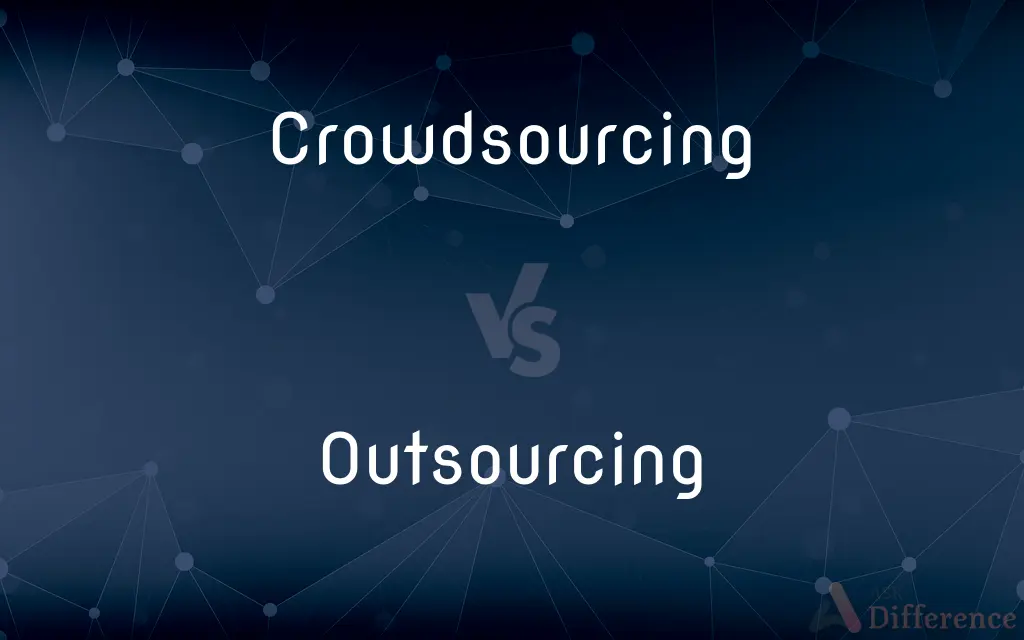Crowdsourcing vs. Outsourcing — What's the Difference?
By Tayyaba Rehman — Updated on October 12, 2023
Crowdsourcing obtains input from a large group, while Outsourcing delegates tasks to an external entity.

Difference Between Crowdsourcing and Outsourcing
Table of Contents
ADVERTISEMENT
Key Differences
Crowdsourcing involves tapping into the collective intelligence or skills of a large group, typically an online community. This method harnesses the diverse ideas and expertise of the masses. Outsourcing, on the other hand, is a business strategy where specific functions or tasks are contracted out to specialized external organizations.
While Crowdsourcing seeks ideas, solutions, or contributions from a wide public audience, Outsourcing typically involves a more formal agreement with a specific third-party provider. The relationship in Outsourcing often revolves around established deliverables and timelines.
Platforms like Kickstarter or Wikipedia are quintessential examples of Crowdsourcing, capitalizing on the voluntary contributions of many. Meanwhile, a company that transfers its customer support or IT services to a firm in another country is practicing Outsourcing.
Crowdsourcing thrives on the principle of collective wisdom and often operates without monetary compensation. In contrast, Outsourcing is a transactional exchange, where services are rendered in return for payment.
To summarize, Crowdsourcing is about pooling resources from a large group for ideas or solutions, whereas Outsourcing involves hiring external specialists or firms to handle particular tasks or functions.
ADVERTISEMENT
Comparison Chart
Definition
Tapping into a large group for input
Delegating tasks to an external entity
Monetary Compensation
Often voluntary or reward-based
Typically contractual and paid
Relationship
Informal, based on contribution
Formal, based on service agreements
Scope
Wide audience participation
Specific third-party involvement
Purpose
Diverse ideas or collective wisdom
Expertise or cost-saving in specific functions
Compare with Definitions
Crowdsourcing
Collecting funds or resources from a large group
She is crowdsourcing funds for her independent film.
Outsourcing
Hiring external agencies for expertise
The startup is outsourcing graphic design to create a compelling brand image.
Crowdsourcing
Soliciting contributions from a wide range of people
The company is crowdsourcing design ideas for its new logo.
Outsourcing
Transferring responsibilities to specialists outside the organization
Outsourcing the marketing efforts allowed for better focus on product development.
Crowdsourcing
Engaging the public in decision-making
The city council is crowdsourcing opinions on the new park design.
Outsourcing
Redirecting tasks to achieve operational efficiency
By outsourcing data entry, the team can focus on data analysis.
Crowdsourcing
Gathering information from the online community
The research team used crowdsourcing to gather data for their project.
Outsourcing
Contracting work to an external entity
The company is outsourcing its IT services to a firm in India.
Crowdsourcing
Leveraging collective intelligence for problem-solving
We are crowdsourcing solutions to address the environmental issue.
Outsourcing
Delegating specific business functions to third parties
To save on costs, they are outsourcing their customer support.
Crowdsourcing
Crowdsourcing is a sourcing model in which individuals or organizations obtain goods or services, including ideas, voting, micro-tasks and finances, from a large, relatively open and often rapidly evolving group of participants. As of 2021, crowdsourcing typically involves using the internet to attract and divide work between participants to achieve a cumulative result.
Outsourcing
Outsourcing is an agreement in which one company hires another company to be responsible for a planned or existing activity that is or could be done internally and sometimes involves transferring employees and assets from one firm to another. The term outsourcing, which came from the phrase outside resourcing, originated no later than 1981.
Crowdsourcing
A method of outsourcing work over the internet or similar network by appealing to people to contribute to the project independently or as a collaboration.
Outsourcing
To delegate (a task, function, or responsibility) to an independent provider
"Most retailers outsource the bulk of their manufacturing to Third World countries, where labor is dramatically cheaper" (James Surowiecki).
Crowdsourcing
The delegation of a task to a large diffuse group in order to introduce new or more developed skill sets and improve efficiency. There is usually no substantial monetary compensation involved.
Outsourcing
To relocate or transfer (jobs) to another labor market
"Although the absolute number of jobs outsourced from developed countries to China remains small, the threat that firms could produce offshore helps to keep a lid on wages" (The Economist).
Crowdsourcing
Present participle of crowdsource
Outsourcing
Inflection of outsource
Outsourcing
The transfer of a business function to an external service provider.
Common Curiosities
Is Crowdsourcing always done online?
While often online, Crowdsourcing can be offline too, but the internet has made it more prevalent.
What is a common reason for Outsourcing?
Cost-saving and accessing specialized expertise are primary reasons for Outsourcing.
Can a company do both Crowdsourcing and Outsourcing?
Yes, a company can use Crowdsourcing for idea generation and then Outsource for implementation.
Can Outsourcing be domestic?
Yes, Outsourcing can be both domestic and international.
Which one involves a formal contract?
Outsourcing typically involves a formal contract, while Crowdsourcing might not.
Why do people participate in Crowdsourcing?
Participants may be driven by passion, rewards, recognition, or the desire to contribute.
What's an example of a Crowdsourcing platform?
Kickstarter, where people fund projects, is a popular Crowdsourcing platform.
What are the risks of Outsourcing?
Outsourcing risks include quality control, communication barriers, and dependency on external entities.
Can Crowdsourcing lead to innovation?
Absolutely, tapping into diverse perspectives through Crowdsourcing can foster innovative solutions.
Is Crowdsourcing always free?
No, while many contributions are voluntary, there can be incentives or rewards.
Is user-generated content a form of Crowdsourcing?
Yes, user-generated content, like reviews or videos, is a form of Crowdsourcing.
Is Outsourcing only about saving costs?
While cost-saving is a significant factor, Outsourcing also allows businesses to tap into global talent and expertise.
What kind of jobs can be Outsourced?
Almost any job can be outsourced, from manufacturing to services like IT or customer support.
How does Crowdsourcing benefit businesses?
Crowdsourcing provides diverse perspectives, quick feedback, and can foster community engagement.
Does Outsourcing affect employment?
It can. Outsourcing might lead to job reductions in one area but can create jobs in the outsourced location or sector.
Share Your Discovery

Previous Comparison
Urgent vs. Emergent
Next Comparison
Ruddy vs. RedAuthor Spotlight
Written by
Tayyaba RehmanTayyaba Rehman is a distinguished writer, currently serving as a primary contributor to askdifference.com. As a researcher in semantics and etymology, Tayyaba's passion for the complexity of languages and their distinctions has found a perfect home on the platform. Tayyaba delves into the intricacies of language, distinguishing between commonly confused words and phrases, thereby providing clarity for readers worldwide.















































